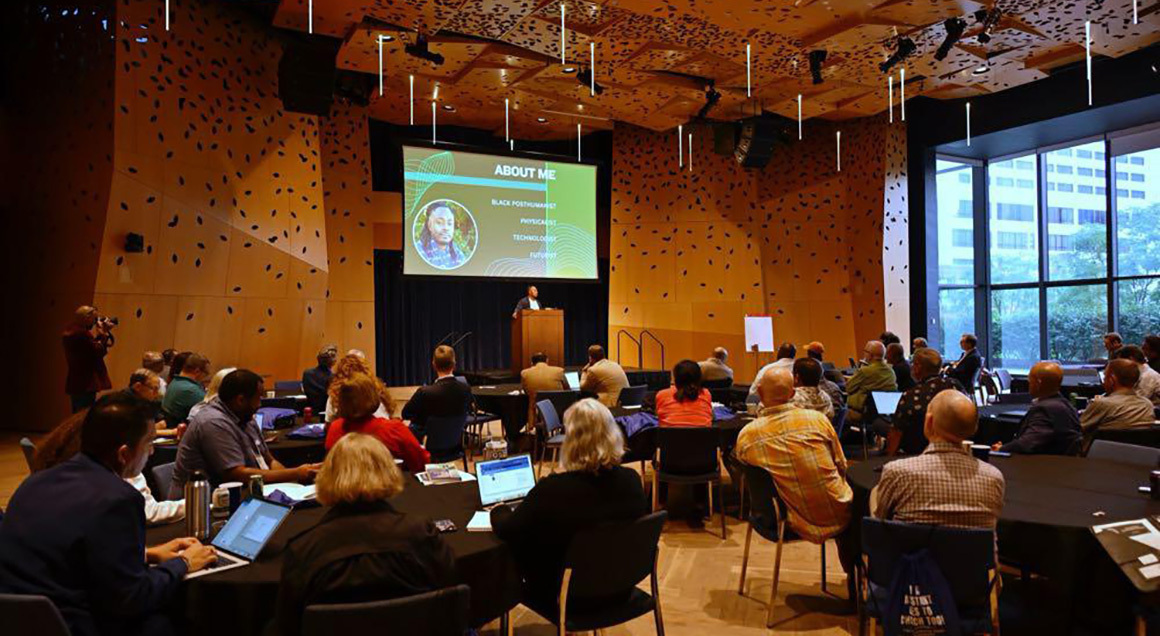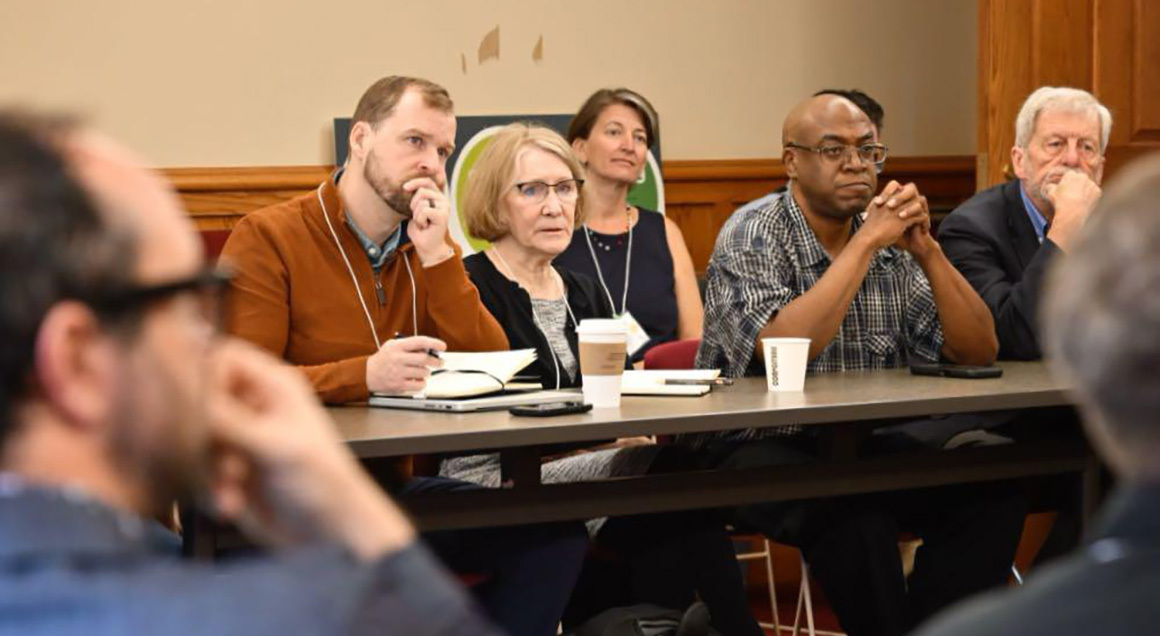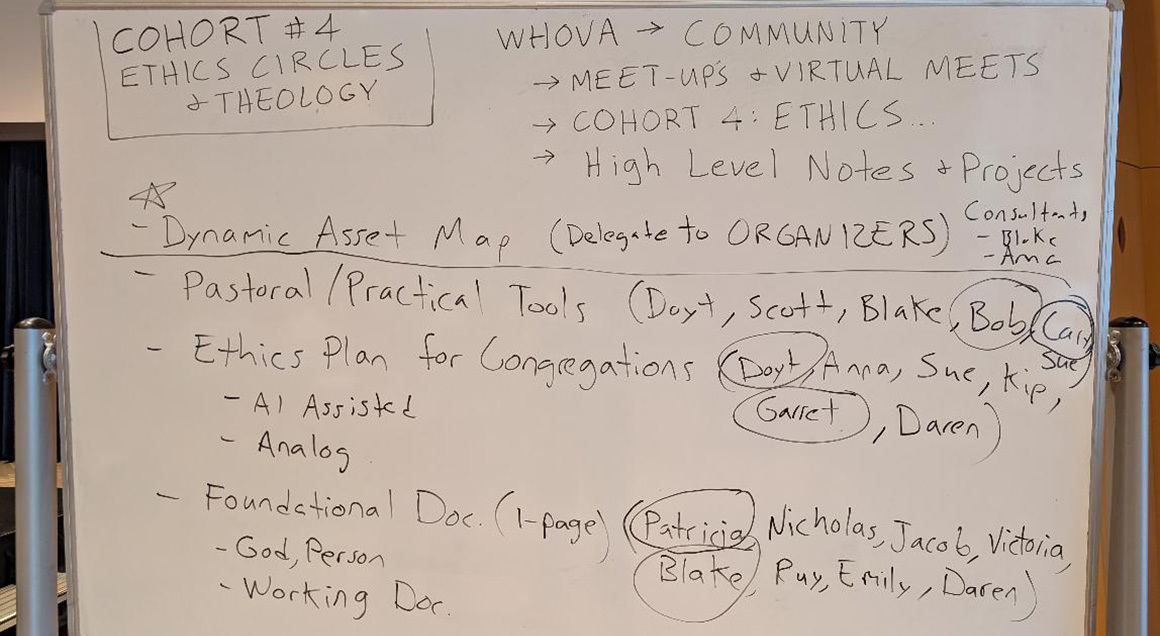Denominational Leaders Gather in Minneapolis to Shape the Faithful Future of Artificial Intelligence
By C. Blake Davis

From September 2-5, church leaders from across denominations gathered in Minneapolis, Minnesota, for Faithful Futures: Guiding AI with Wisdom and Witness. This unprecedented gathering was deliberately intimate. It was capped at seventy-five in-person participants from the Evangelical Lutheran Church in America (ELCA), the Presbyterian Church (PCUSA), the Episcopal Church (TEC), and The United Methodist Church (UMC).
I ran the livestream team that enabled Discipleship Ministries to broadcast the plenaries to anyone interested in attending, extending the registrants to ten other denominations, nine universities, ten seminaries, and dozens of civic, corporate, and nonprofit institutions.
A member of one of the cohorts I attended likened the event to an ecumenical gathering in the 1990s that focused on the use of an emerging technology— email —within denominations.
Faith’s Values at the Tech Table
The timing of the summit was striking. In the middle of the event, Microsoft released a study concluding that tech companies are better when they incorporate faith-shaped values—humility, embodiedness, community, and wonder—into their design.
As the AI officer for Discipleship Ministries, I regularly hear fears that AI will “make leaders lazy,” “weaken critical thinking,” or “further the disconnections felt within society.” However, this is precisely when the church is most needed. As technology accelerates, the church can remind humanity that convenience and efficiency are not the same as purpose, and (as discussed in one of the morning sessions at Faithful Futures) character is developed among friction, formation, and community.
If Microsoft can conclude that faith-based communities (often an afterthought in Silicon Valley) can contribute what technologies lack, gatherings like this one may signal a different future: churches stepping into the conversation not with suspicion or judgment, but with concern for conviction, theological values, and hope.
What It Means to Be Human in an Age of AI
The opening plenary by Dr. Philip Butler (assistant professor of theology and Black post-human artificial intelligence systems at Iliff School of Theology) cast AI inside a bigger framework of global politics, surveillance, and power. He called the church to resist homogenized definitions of humanity, instead embracing a “constellational ethic” shaped by culture, history, and humility.
In an offline optional gathering over coffee, Lorenzo Lebrija (chief innovation officer of Virginia Theological Seminary and the executive director of TryTank Research Institute) asked participants to wrestle with the concept of Artificial General Intelligence (AGI). With the possibility of entry-level jobs being drastically reduced in the next decade, the church, he argued, must be prepared to advocate for the vulnerable and amplify the voices of young people in the AI era.

Jovonia Taylor-Hayes, a former Boeing chief engineer with four decades of technical and faith-based leadership experience, reminded participants that AI is not just a technical tool, but a moral one. She challenged churches to adopt five tenets for using AI: vision, ethics, investment, compassion, and governance.
In a small, optional roundtable gathering titled “The Actual Power of Humanity,” Rev. Doyt Conn (Rector of the Epiphany Parish in Seattle) invited the room into theological anthropology around what it means to be human. A participant inquired about the meaning of being “begotten, not made” if technology increasingly mirrors or surpasses human intelligence and physical capabilities. Rev. Conn’s discussion highlighted the church's need to reclaim community, service, and embodied belonging as counterweights to the frictionless promises of technology.
Game designer Jane McGonigal led a full-day social simulation where participants imagined the world in 2035. Teams confronted such questions as:
- How does the church serve a “jobless generation” when work no longer defines identity?
- What dignity must be preserved when people form relationships with AI companions?
- How might churches counteract misinformation or provide sanctuary spaces free from technological surveillance?
The simulation results placed Jobless Generation (44%) and AI Companions (31%) as top priorities for participants. McGonigal described churches as potential “imaginetic centers,” sanctuaries of imagination where hope is cultivated against despair.
Denominational Policy Development
Scott Hughes (Discipleship Ministries Associate General Secretary) and I were asked to attend a small, ecumenical roundtable for collaboration around denominational guidelines.
An ELCA Bishop mentioned Discipleship Ministries’ AI Guidelines, developed in January 2024, and our “Three Categories of Generated Content” as being “incredibly helpful” in preparing their work as they begin the development process. His comments were a reminder that even imperfect, early efforts can have a lasting impact across denominations.
We learned that the Presbyterian Church (PCUSA) is developing a comprehensive AI policy before its General Assembly meeting in 2026. The Episcopal Church has a twenty-two-member task force developing work for 2027. The ELCA recently authorized a denomination-wide ethics study and has been tasked with formulating its AI guidelines.
This created some urgency for us as Scott Hughes and I lead our Advanced AI Cohort training and prepare to meet with two other annual conferences to give feedback on the development of AI guidelines. Although our next General Conference is years away, we must not develop our responses to this technology in silos. We have the opportunity to establish a common language across our connections. Strength comes from unified clarity as we join this ecumenical table to collaborate on shared foundations around AI technologies, working as a broader body of Christ.
My Role and Commitments
Based on votes from the planning committee and attendees, the event selected four “cohort” topics that were addressed throughout the event:
- AI & Local Mission & Church Operations
- Formation of Youth / Young Adult
- Ethics Circles and Theology
- AI & Faith Communication & Congregational & Listening
I have been teaching AI technologies with constituents for two years, with the intention of helping church leaders understand and use AI tools and engage with the nuances of this knowledge. However, I have been cautious to avoid speaking as an ethicist (for one reason: I am not one), so I joined Cohort 4: Ethics Circles and Theology to grow and contribute in practical ways. I’m now helping to organize the ecumenical cohort projects as they break into working groups tasked with developing a dynamic asset map, collating pastoral tools, creating ethics plans for congregations, and drafting a one-page ecumenical foundational document.

Walking Away with Hope and Fear
I left Minneapolis both more afraid and more hopeful than when I arrived. The risks of AI are real: ecological strain, disinformation, job loss, unhealthy attachment to and reliance on technologies (not just AI), the potential for issues already felt by minority groups to become compounded with more powerful digital tools, and even distortions of identity itself.
However, as I participated in the event planning group debriefs at the start and end of each day, I learned that those around the table represented 48,000 congregations and more than twelve million members. That collective voice, if coordinated, could shape local church AI use and global conversations about AI ethics and governance. Events like this are the start. The possibilities are real: renewed collaboration across denominations, new tools for ministry, new examinations of the church’s place in the future of humanity.
I also envision a larger dream: we can be part of the representatives of mainline denominations standing together at UNESCO, the AI Safety Summit, and the Global Conference on AI Security and Ethics, presenting co-written principles based on shared values and beliefs across denominations. We can collectively state that faith has something essential to offer regarding human uniqueness in the age of AI.
As former Boeing chief engineer Jovonia Taylor-Hayes explains, “A leader doesn’t put their head in the sand; they face what is coming head on.”
That’s what I saw in Minneapolis: leaders of the church connecting across denominations, holding fear and hope together, and choosing to build a faithful future.
C. Blake Davis serves as the Executive Director of Marketing and Delivery and AI Officer at Discipleship Ministries, an agency of the United Methodist Church.
This content was developed by Discipleship Ministries staff using AI tools in alignment with our AI Usage Guidelines. In this case, AI assisted the author with ideation, outlining, summarization of event notes, drafting sample narrative structures, and refining tone and flow. All final text was written, reviewed, and approved by human contributors.
Contact Us for Help
Contact Discipleship Ministries staff for additional guidance.
